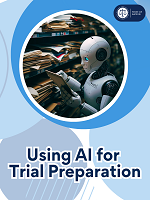
Using AI for Trial Preparation: Managing Overwhelming Caseloads (2025)
Program Summary: This 1-hour program offers defense lawyers practical strategies for using artificial intelligence to manage overwhelming caseloads more efficiently while maintaining ethical safeguards. It demonstrates how AI can streamline discovery by summarizing thousands of pages of reports, transcripts, and digital records into clear timelines, relationship maps, and contradiction charts—tasks that traditionally take weeks of manual review but can now be completed in seconds.
The training also shows how AI can be integrated into trial preparation. Lawyers will see how it can assist in drafting cross-examinations, analyzing juror questionnaires, and testing case narratives in ways tailored to their own cognitive and organizational style. By creating customized workflows, attorneys can save hours each week while sharpening their advocacy, from voir dire through closing arguments.
Another major benefit is learning how to use AI for post-trial advocacy, including analyzing sentencing data to argue for reduced penalties and tracking new developments in case law or public sentiment. The program also covers critical ethical considerations—such as confidentiality, verification, and disclosure—ensuring that lawyers not only use these tools effectively but also in compliance with professional obligations.
For defense practitioners, the takeaway is concrete: with the right systems, AI can reduce repetitive work, enhance accuracy, and free up valuable time to focus on strategy, client relationships, and courtroom advocacy. Those who adopt these tools will be better positioned to keep pace with the demands of modern capital defense while improving the quality of representation.
This program will teach you to:
- Streamline discovery review: Upload thousands of pages of reports, jail calls, or forensic files into AI to instantly generate summaries, timelines, contradiction charts, and relationship maps, saving weeks of manual work.
- Customize AI to your practice: Learn how to “train” AI on your own frameworks (how you outline cases, write motions, or organize facts) so the output matches your style instead of starting from scratch.
- Transcribe and translate evidence quickly: Use AI to turn handwritten letters, Spanish-language documents, or hours of jail calls into accurate, searchable transcripts within minutes — with disclaimers to satisfy courts.
- Search videos by description: Convert bodycam or surveillance videos into scene-by-scene transcripts and descriptions so you can later find a clip by searching for “blue truck” or “downtown bank” instead of rewatching hours of footage.
- Prepare smarter cross-examinations: Feed discovery into AI to build chaptered cross outlines (e.g., Pozner’s method), highlight contradictions, and even expand single questions into detailed, fact-driven sequences.
- Analyze juror questionnaires: Let AI read handwriting, categorize jurors based on law enforcement ties or prior jury service, and flag likely favorable or unfavorable jurors to speed up voir dire prep.
- Automate repetitive tasks: Set up AI “agents” to monitor social media, case law, and news coverage of your case and email you updates every morning, so you never miss new developments.
- Leverage sentencing data: Use federal sentencing spreadsheets with AI to generate objective comparisons to similar defendants, providing judges with data-driven arguments for lower sentences.
- Create custom trial tools: Build personalized apps with AI coding (e.g., a note-taking/cross-exam.
CLE Credit: Up to 1 hour of self-study CLE credits; where authorized. Please confirm with your state's CLE commission to ensure this program is available for self-study CLE certification.
Discover more AI Programs from NACDL:
AI Rising: Integrating & Fighting Artificial Intelligence
Making Sense of Science: Forensic Science, Technology & the Law (2025)
Leveraging AI Technology in Criminal Defense: Complex Discovery and Beyond
About the Presenter:
Felix Valenzuela (El Paso, TX)
Felix Valenzuela is a criminal defense attorney practicing in El Paso, Texas, specializing in complex federal litigation, including capital cases. He has represented defendants in numerous capital prosecutions, including several death penalty cases, achieving life verdicts and successful outcomes through trial advocacy and sentencing strategy. In addition to his trial experience, Felix is at the forefront of integrating artificial intelligence into criminal defense practice. He has completed postgraduate training in Artificial Intelligence and Machine Learning at the University of Texas at Austin and regularly develops AI-driven tools to improve defense strategies, streamline case preparation, and enhance litigation efficiency. Felix frequently trains attorneys on leveraging AI technology ethically and effectively in criminal defense. Felix has taught advanced legal courses at the University of Texas at El Paso, including Legal Reasoning, Advanced Legal Composition, and Philosophy of Law. His teaching integrates legal theory with practical courtroom applications, preparing lawyers for persuasive and effective advocacy in high-stakes trials. Felix earned his Juris Doctor from Yale Law School and his Masters from the University of Notre Dame; he is licensed to practice law in Texas and New Mexico.
Prices
- List Price $40.00
- Member Price $30.00